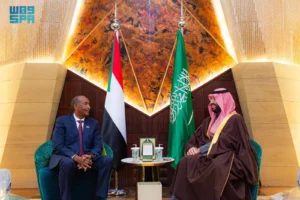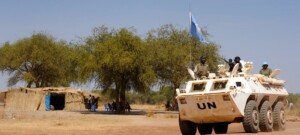UN rights experts condemn capital charges for human rights activists in Sudan
A group of United Nations human rights experts today called on the Sudanese authorities to drop charges carrying the death sentence brought against six people linked to a prominent Khartoum-based organisation, Training and Human Development (TRACKS).
A group of United Nations human rights experts today called on the Sudanese authorities to drop charges carrying the death sentence brought against six people linked to a prominent Khartoum-based organisation, Training and Human Development (TRACKS).
The six*, who were detained some three months ago but are yet to face trial, have been charged with criminal conspiracy, undermining the constitutional system, waging war against the State, espionage, and terrorism by the Sudanese State Security Prosecution Office. All these charges carry the death penalty.
“The death penalty is an extreme form of punishment. lf used at all, it should only be imposed after a fair trial that respects the most stringent due process guarantees as stipulated in international human rights law,” said UN Special Rapporteur on extrajudicial, summary or arbitrary executions Agnes Callamard. “I am seriously concerned that any trial of these six people would not uphold such principles.”
Human rights
“The charges brought against them appear to be directly linked to their work in the defence of human rights, while exercising their rights to freedom of expression and freedom of association,” said the UN Special Rapporteur on the rights to freedom of peaceful assembly and of association, Maina Kiai.
“Sudan ratified the International Covenant on Civil and Political Rights, a binding instrument, which enshrines the rights to freedom of expression and freedom of association and this sentence is likely to have a chilling effect among activists and human rights defenders in Sudan,” he added.
The human rights experts have already jointly raised their concern to the Sudanese authorities about the ongoing harassment of TRACKS members and, more broadly, about the increasing targeting and prosecution of human rights defenders, including women human rights defenders, in Sudan for undertaking their peaceful and legitimate human rights activities.
Curbing freedoms
“This action is part of an increasing trend to threaten, harass, or intimidate key members of Sudanese civil society, and to curb freedoms of expression and association, which are guaranteed in the Bill of Rights of the Interim National Constitution of the Sudan,” said Aristide Nononsi, the Independent Expert on the situation of human rights in the Sudan, who visited the country in April 2016. Nononsi had already expressed concern about this case to the relevant Sudanese authorities. ”Human rights defenders play an important role in the country, and there is an urgent need for the Government of the Sudan to allow them to carry out their activities in an open, safe and secure environment,” he stressed.
*The six facing charges are Khalafalla Mukhtar, Director of TRACKS; Arwa Elrabie, Midhat Hamadan, and Alhassan Kheiri, TRACKS’ employees; and Mustafa Adam and Raye Imany Leyla who are affiliated to the organisation.
The experts’ appeal to the Sudanese Government has been endorsed by the Special Rapporteur on freedom of opinion and expression, David Kaye, and the Special Rapporteur on the situation of human rights defenders, Michel Forst.
FIDH Congress
In a separate statement, the 39th FIDH Congress that met in Johannesburg in South Africa from 25 to 27 August 2016, expressed its solidarity and its “support with human rights defenders who, across the planet, are subjected to harassment, attacks, repression and criminalisation for promoting human rights.”
The statement stresses that “safety of human rights defenders is especially precarious in conflict, post-conflict and security crisis situations”.
It emphasises that “the vulnerability of human rights defenders is often compounded by a lack of visibility, lack of recognition and understanding of their role, by the impunity of perpetrators of violations, by the campaigns to discredit and stigmatise human rights defenders and the hindrance of their work, by the insufficient recognition of categories of human rights, such as rights related to land and environment and rights related to gender identity and sexual orientation, by the limited capacity of protection mechanisms and by the collusion of state and non state actors.”
In Sudan, it singles-out the detention of the TRACKS activists. The statement denounces “the recent assassination of human rights defenders committed in several countries, such as in Azerbaijan, Bangladesh, Brazil, Burma, Burundi, Cambodia, Cameroon, the DRC, Guatemala, Honduras, Iraq, Kenya, Libya, Pakistan, South Africa, Syria, Thailand, The Philippines and Turkey.











 and then
and then